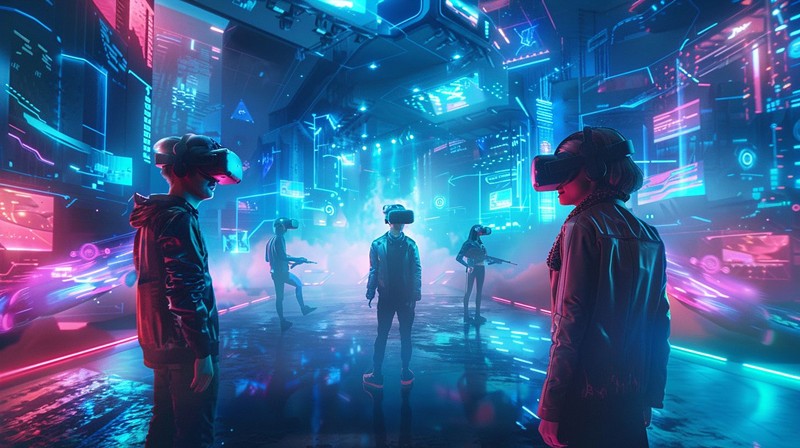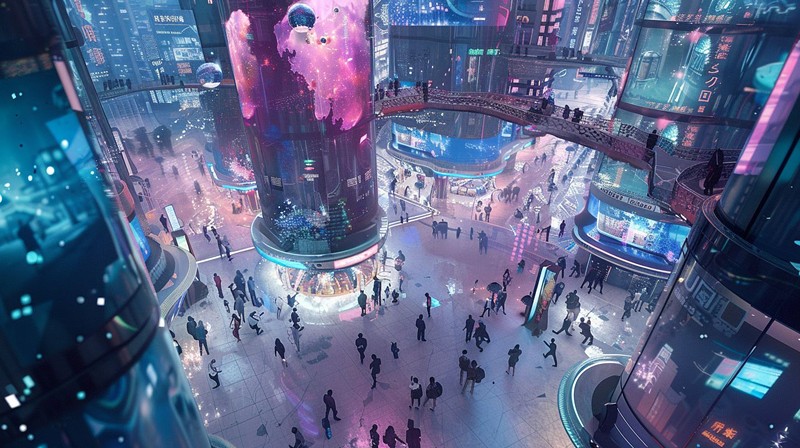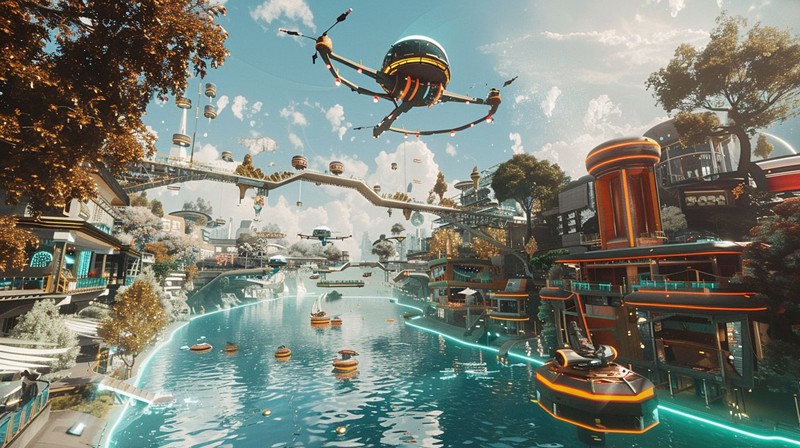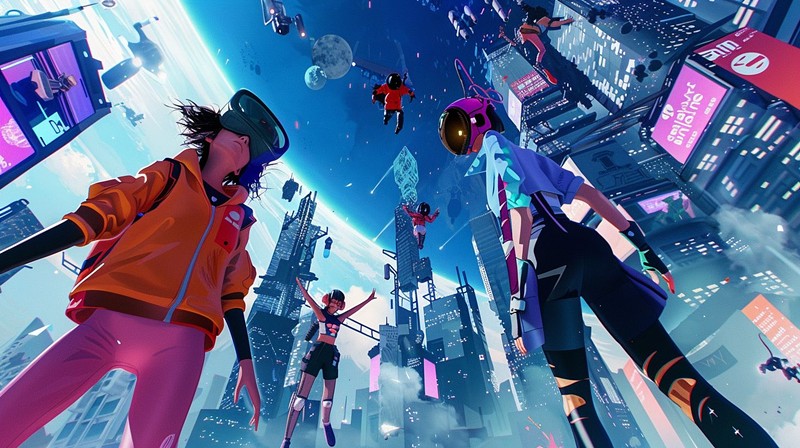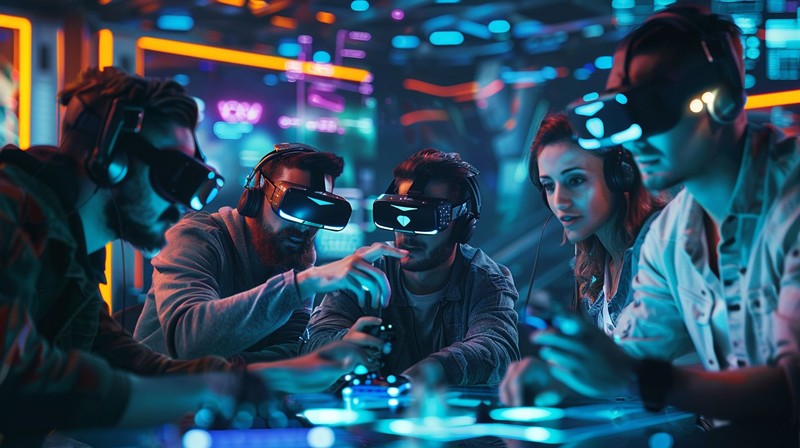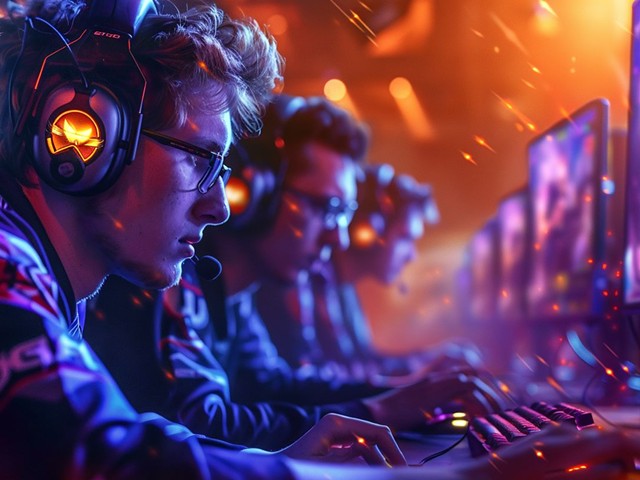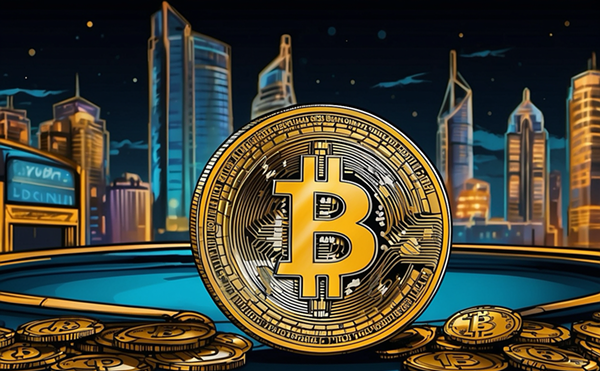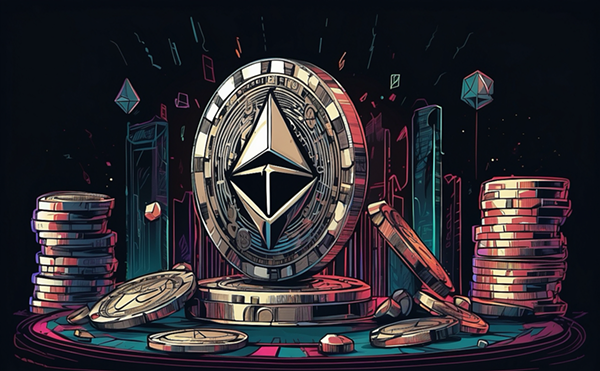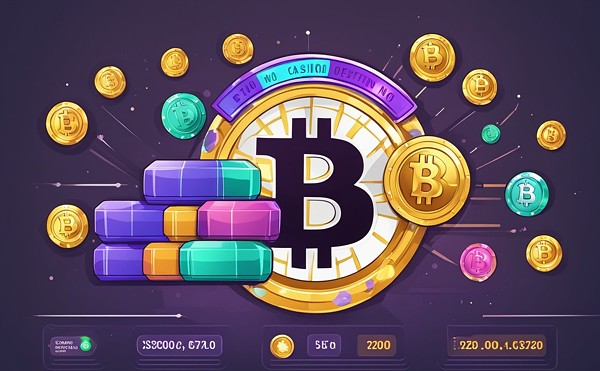The metaverse in gaming creates a vast, immersive world where players can interact with each other and their environment in ways that mimic real-life actions.
This digital universe is crafted using cutting-edge technologies such as virtual reality (VR), augmented reality (AR), and blockchain, enabling gamers to engage in complex, interactive networks of virtual spaces.
Here, experiences go beyond conventional gaming, allowing players to live out entire lifespans within these computer-generated environments.
Gamers now have unparalleled opportunities for exploration, social interaction, and even earning real-world value through play-to-earn games within these expansive virtual landscapes.
These interconnected worlds support various activities including building properties, competing in challenges, or engaging in social events just like one would do offline but with the added thrill of VR immersion and AR enhancements.
With 97% of experts asserting gaming's crucial role in developing the metaverse and predicted revenues hitting $800 billion by 2024—more than half attributed to gaming—the sector shows no signs of slowing down.
This fusion of technology aims not only at amplifying entertainment but also reshaping how we perceive digital interaction and community building.
Types of Metaverse Gaming
Metaverse gaming includes social gaming, play-to-earn games, portable game assets, and mixed reality experiences. These types of gaming allow for immersive experiences and the creation of unique digital assets.
Social gaming
Social gaming transforms the virtual environment by making interactions with other players a core part of the experience. It is rapidly expanding within online gaming, creating communities and strengthening connections through shared adventures and objectives.
Players engage in games that are not just about competition but also about collaboration, communication, and socialization. This trend is driving an increasing demand for games that support multiplayer modes where friends and strangers can connect, chat, and embark on virtual quests together.
The growth of social gaming signifies a shift towards more immersive experiences in the metaverse. With technologies such as artificial intelligence (AI) and augmented reality (AR), these games become more than simple pastimes; they offer deep engagement by integrating digital avatars, in-game economies, and real-time interactions among players.
As part of this burgeoning sector, developers are leveraging blockchain technology to ensure secure transactions while offering unique digital assets like non-fungible tokens (NFTs).
The global metaverse market's expected surge to $1,527.55 billion by 2029 highlights the vast potential of incorporating social elements into virtual worlds, promising a future where online gaming is inseparable from robust social networks.
Play-to-earn
Play-to-earn games are changing how players interact with virtual worlds by allowing them to earn real-world value from in-game items. Players complete tasks and missions to collect digital assets, such as cryptocurrencies and NFTs (non-fungible tokens), that have value both inside and outside the game.
This model not only makes gaming more exciting but also opens up new ways for players to profit.
The metaverse broadens these opportunities, offering a space for trading assets with others involved in crypto gaming. Gamers can even create content or build their own sub-games, enriching the overall experience.
With an industry revenue expected to hit $800 billion by 2024, play-to-earn is quickly becoming a cornerstone of metaverse gaming, transforming it into a lucrative digital economy where everyone has a chance to earn.
Portable game assets
Moving from play-to-earn models, portable game assets offer a unique twist in the gaming metaverse. These assets, like weapons or avatar enhancements, can travel with you across different virtual environments.
Governed by NFT (Non-Fungible Token) rules, they ensure that players retain persistent ownership of their digital items no matter where they are used. This flexibility not only enhances the gameplay experience but also adds a layer of value to each item beyond its initial game.
The use of NFTs to represent these portable game assets has sparked significant interest among gamers and developers alike. It allows for increased customer satisfaction as players see real value in their investments and efforts within games.
Moreover, it opens up new visibility channels for products within different metaverse platforms. While there's an ongoing discussion about viable business models to fully capture value from these NFT-based assets, their potential in transforming how we perceive ownership and trade within virtual spaces is undeniable.
Mixed reality experience
Mixed reality experience seamlessly blends the physical and virtual worlds, providing an immersive gaming encounter. Using augmented reality (AR) and virtual reality (VR) technologies, mixed reality in gaming allows players to interact with lifelike digital components within their physical environment.
This unique approach enhances the overall gaming experience by integrating real-world elements into virtual settings, pushing the boundaries of traditional gameplay.
Metaverse gaming leverages mixed reality experiences as a key component, bridging the gap between the physical and digital realms to create captivating and highly engaging gameplay.
Technologies Powering Metaverse Gaming
Technologies such as artificial intelligence, augmented reality, blockchain, and 3-D reconstruction drive the immersive experiences in metaverse gaming. These technologies enable interactive gameplay through AI-powered characters, AR/VR environments, digital asset ownership via blockchain, and lifelike virtual worlds created with advanced 3D technology.
Artificial intelligence
Artificial intelligence plays a significant role in metaverse gaming. It is used to create realistic virtual environments by integrating IoT sensors and data from various sources. AI helps in generating accurate simulations, enhancing user experiences, and supporting the development of interactive elements within the metaverse gaming world.
Furthermore, career opportunities in this field include roles such as data scientists and machine learning engineers who contribute to leveraging artificial intelligence for creating immersive virtual environments.
In metaverse gaming, artificial intelligence works alongside AR/VR technologies, blockchain, IoT sensors, and 3-D reconstruction tools to bring about realistic virtual realms while offering potential career paths for individuals with expertise in data science and machine learning engineering.
Augmented reality and virtual reality technologies
Augmented reality (AR) and virtual reality (VR) technologies fuel the development of immersive 3D experiences crucial for metaverse gaming. By integrating AR and VR, game developers create lifelike virtual environments that players can explore and interact with in real time.
These technologies have already revolutionized the gaming experience, fostering a sense of presence and immersion unparalleled by traditional games.
The utilization of AR and VR has significantly impacted the gaming industry by providing gamers with innovative platforms to immerse themselves entirely in virtual worlds, setting the stage for a dynamic future of gaming experiences.
As these advancements continue to shape the landscape of modern gaming, AR and VR stand as essential elements driving metaverse development forward.
Blockchain and cryptocurrency
Blockchain technology and cryptocurrency have revolutionized the metaverse gaming landscape by decentralizing projects, enhancing digital collectability, and simplifying interoperability.
This innovative technology allows for seamless exchange between crypto assets and gaming assets, such as NFTs, powering a new era of secure and transparent virtual economies within the gaming world.
The integration of blockchain and cryptocurrency has streamlined transactions within metaverse gaming while ensuring a high level of security through decentralized systems. With these technologies underpinning the virtual economy, gamers can engage in secure asset exchanges while experiencing the benefits of a robust digital ecosystem.
Internet of Things (IoT)
The Internet of Things (IoT) plays a crucial role in metaverse gaming, connecting physical elements to the internet through sensors that collect data. This data is then used to create accurate virtual environments within metaverse gaming.
IoT facilitates potential career opportunities in areas such as development, network engineering, and security within the realm of metaverse gaming. The integration of IoT not only drives technological advances but also underpins the development and operation of metaverse gaming, presenting a gateway to potential career paths linked with the industry.
The use of sensors for collecting real-world data enhances immersive experiences while creating accurate virtual environments for users to explore. These advancements position IoT as integral in shaping the ever-evolving landscape of metaverse gaming and its associated career prospects.
3-D reconstruction
3-D reconstruction technologies bring virtual environments to life in metaverse gaming. Designers, animators, and software engineers utilize these tools to meticulously craft immersive digital worlds.
By integrating data from the Internet of Things (IoT), such as sensor-collected information, accurate and dynamic virtual landscapes are created. These professionals play a crucial role in shaping the ever-evolving realm of metaverse gaming by incorporating cutting-edge 3-D reconstruction techniques for realistic and captivating user experiences.
Key Players in Metaverse Gaming
Key players in metaverse gaming include Decentraland, Sandbox, Epic Games, Meta (Facebook), Microsoft, Roblox, and Niantic. These companies have been at the forefront of developing immersive and interactive virtual worlds for gamers.
Decentraland
Decentraland, a significant player in the metaverse gaming industry, is closely associated with key industry players such as Sandbox, Epic Games, Meta (Facebook), Microsoft, Roblox, and Niantic.
This platform provides a decentralized blockchain for creating games and content within the metaverse. Decentraland also presents various career opportunities in data science, machine learning engineering, AR/VR software engineering, and more within the metaverse gaming industry.
Associated Keywords: decentralized blockchain platform, creating games and content within the metaverse,
Sandbox
Transitioning from Decentraland to Sandbox, another prominent name in the metaverse gaming space is The Sandbox. This platform is based on Ethereum’s blockchain, offering users the ability to create, purchase, and sell virtual assets and real estate.
Built as an open-platform game within the Ethereum framework, it allows players to own land, develop unique locations, design games, and capitalize on their land for profit through monetization opportunities.
The in-game 3D modeling tool empowers players to craft vehicles, avatars, and a variety of objects that can be listed for sale in the marketplace. With its emphasis on user-generated content and ownership of digital assets powered by blockchain technology, The Sandbox is reshaping how gamers interact with virtual worlds.
Epic Games
Epic Games, known for creating popular titles like Fortnite and Gears of War, is a major player in the metaverse gaming space. Leveraging its Unreal Engine, Epic Games has been at the forefront of developing technologies that power immersive virtual experiences.
With an eye on the future, Epic Games continues to invest in cutting-edge augmented reality and virtual reality technologies to push the boundaries of what's possible in digital realms.
Furthermore, Epic Games made headlines with its acquisition of ArtStation and Sketchfab to expand its reach into 3D assets and creative tools - essential elements for shaping the metaverse.
Meta (Facebook)
Meta (Facebook) is a major player in the metaverse gaming industry, asserting its influence through strategic investments and partnerships. With its technology and infrastructure, Meta is poised to shape the future of metaverse gaming.
The company's involvement has underscored the growing significance of the metaverse, as it accelerates efforts to redefine interactive experiences for gamers worldwide.
Microsoft
Moving from Meta (Facebook) to Microsoft, it's clear that tech giants are actively investing in the development of metaverse gaming. As one of the key players in this realm, Microsoft is deeply involved in shaping the future of immersive digital experiences.
Microsoft is a major force within the metaverse gaming sector, leveraging its advanced technologies to drive innovation and engagement. With a strong focus on alternative reality, 3-D avatars, and interactive gameplay, the company showcases its commitment to creating virtual worlds and enriching gaming experiences.
Through strategic partnerships with key industry players and multibillion-dollar deals in the gaming space, Microsoft solidifies its position as a significant player in this rapidly expanding domain.
Roblox
Roblox stands as a significant player in the metaverse gaming industry, providing an expansive platform that allows users to create and play games within a virtual environment. The platform not only offers a variety of user-generated games but also provides robust tools for game creation, enabling players to bring their imaginative concepts to life.
With its emphasis on creativity and social interaction, Roblox has attracted millions of users who actively participate in designing, building, and playing games across different genres.
As one of the leading metaverse platforms, Roblox continues to shape the landscape of virtual gaming experiences through its user-friendly interface and extensive library of content.
Niantic
Niantic actively develops metaverse gaming apps, leveraging cutting-edge technologies such as 3D reconstruction, AR, IoT, AI, and blockchain. As a prominent entity in the metaverse gaming industry, Niantic plays a pivotal role in shaping the future of online interactions and content ownership.
The company's contribution allows for immersive experiences that enable users to connect, work, generate income, and engage in virtual events within the metaverse. Through its focus on real-world metaverse gaming experiences, Niantic solidifies its position as an innovative force driving the evolution and expansion of this burgeoning industry.
An essential player in advancing metaverse gaming development is Niantic. Its involvement underscores the company's commitment to redefining virtual gaming experiences through its pioneering tech solutions.
Examples of Metaverse Gaming
Explore a variety of metaverse gaming experiences such as Alien Worlds, Axie Infinity, Chain of Alliance, Farmers World, Krystopia, and Pokemon Go. Read on to discover the diverse opportunities awaiting in the realm of metaverse gaming.
Alien Worlds
Alien Worlds provides unique virtual experiences and is a popular metaverse game. Associated with the gaming metaverse, Alien Worlds offers players an immersive experience within its virtual world.
This popular game stands out for its innovative approach in creating a distinct and captivating gameplay environment, making it one of the top choices in the realm of metaverse gaming.
Axie Infinity
As we shift from exploring Alien Worlds to Axie Infinity, it’s essential to focus on one of the significant players in metaverse gaming. Axie Infinity is a prime example that showcases the potential of this concept within the gaming industry.
Not only does it offer players an immersive experience, but it also provides them with opportunities to earn in-game items with real-world value through play-to-earn games. The popularity and success of Axie Infinity emphasize how metaverse gaming has evolved beyond traditional boundaries, providing new avenues for entertainment and financial growth.
With its groundbreaking approach to merging virtual worlds with real-world rewards, Axie Infinity continues to redefine the landscape of modern gaming.
Chain of Alliance
Chain of Alliance exemplifies the innovative and multifaceted gaming experiences within the metaverse. It offers diverse gaming opportunities, including profitable activities and asset trading with other players through crypto gaming.
The game is governed by NFT rules for persistent ownership, enabling portable game assets. As it continues to evolve, Chain of Alliance holds potential for increasingly immersive and interactive experiences in the metaverse.
The future of Chain of Alliance in the metaverse presents an ever changing landscape promising novel and engaging gameplay experiences.
Farmers World
Farmers World is a popular metaverse game where players focus on farming, mining, and cultivating resources without a specific storyline. The game offers unique virtual experiences by allowing players to own and cultivate virtual farming plots or islands in the multiplayer game My Neighbor Alice.
It also features personalized monsters with NFT value, adding an exceptional element to the gameplay.
The online game provides players with opportunities to engage in activities related to farming and resource cultivation within a virtual environment while offering them ownership of their virtual farming plots or islands.
Krystopia
Krystopia is a puzzle-focused game, centered on navigating mazes and solving challenges. Unlike some other metaverse games, Krystopia does not incorporate blockchain-based in-game economies or offer a 3D modeling tool for creating and selling virtual assets.
Specifically, Krystopia is distinct from games like Pokemon Go and Chromia due to its unique focus on puzzles and lack of association with NFT card creation.
The game also differs from others built on the Ethereum framework, such as SANDBOX. Moreover, while there are no specific skills tied to working in metaverse gaming related to Krystopia, it offers an experience tailored toward immersive puzzle-solving without the complexities associated with blockchain or NFTs present in other metaverse games.
Pokemon Go
Pokémon Go is a standout example of augmented reality gameplay that blurs the line between digital and physical.
With its inception in 2016, Pokémon Go pioneered the integration of real-world landscapes with augmented reality elements. The game has inspired subsequent metaverse games like Axie Infinity while remaining at the forefront of incorporating real-life locations into the gaming experience.
Since its launch, Pokémon Go has continually evolved by adding new features such as NFT pokemon cards that have become valuable digital assets within its gameplay economy. As augmented reality technology continues to advance, Pokémon Go remains a shining beacon for how gaming can be seamlessly woven into everyday experiences through mobile devices.
Future Opportunities in Metaverse Gaming
Future opportunities in metaverse gaming include potential e-commerce and career paths, along with the development of specialized degrees and qualifications. These aspects are poised to shape a new landscape for individuals interested in exploring this burgeoning industry.
E-commerce opportunities
Metaverse gaming presents lucrative e-commerce opportunities, allowing users to monetize virtual worlds. Through in-game 3D modeling tools, players can create and sell a variety of virtual assets such as items, vehicles, and avatars within the metaverse marketplace.
Furthermore, NFTs serve as digital representations of assets that can be bought and sold within the metaverse, expanding the scope for e-commerce transactions. The incorporation of stores and marketplaces within the metaverse offers new avenues for revenue generation through e-commerce activities like buying and selling virtual goods.
Technologies like blockchain and cryptocurrency are utilized for payments within the virtual world, contributing to the e-commerce aspect of metaverse gaming by providing secure transaction methods.
Career opportunities
The metaverse gaming industry provides a wide range of career opportunities for individuals. Roles such as designers, animators, software engineers, and computer vision engineers are in high demand.
With the global metaverse market poised to reach $1,527.55 billion by 2029, the industry is expected to create numerous employment prospects within metaverse gaming. Moreover, technological advancements like 3D reconstruction, augmented reality (AR), Internet of Things (IoT), artificial intelligence (AI), and blockchain will further enhance the outlook for job seekers looking to explore careers within this ever-evolving field.
As the industrial metaverse transforms manufacturing processes, it will open up job roles in virtual modeling, digital twin development, AR applications, IoT implementation and management strategies in cloud computing environments leading to increased opportunities across varying sectors.
This diverse landscape ensures that professionals with expertise in metaverse development and virtual reality will continue to be sought after as this promising niche continues its exponential growth trajectory.
Degrees and qualifications for metaverse gaming
Degrees and qualifications for metaverse gaming require a blend of technical expertise, creative skills, and understanding of emerging technologies. Specialized degrees in fields like computer science, game design, 3-D animation, AI, blockchain technology or AR/VR development can provide a strong foundation.
Additionally, certifications in areas such as cybersecurity and blockchain can enhance job prospects and demonstrate competence in addressing industry-specific challenges. Given the evolving nature of metaverse gaming, continuous learning is crucial to stay competitive in this fast-paced field.
Challenges in Metaverse Gaming
Securing user data, incorporating NFTs, and managing child-appropriate services are some pressing challenges in metaverse gaming. Data security is essential for protecting user information and privacy.
Incorporating NFTs into gaming raises concerns about ownership rights and digital asset management, while managing child-appropriate services involves creating a safe environment for young users.
Data security
Gaming companies face a significant challenge in safeguarding user data due to concerns about privacy regulations, data collection, and user-to-user privacy. Protecting massive amounts of data from cybercriminals is crucial for ensuring transparency, safety, and brand loyalty among gamers.
A focus on managing user data and protecting personal information from cyber attackers is essential, calling for expertise in data analytics and cybersecurity.
Cybersecurity experts play a vital role in addressing the challenge of protecting extensive data from potential breaches by cyber criminals, emphasizing the importance of stringent measures to ensure users' privacy.
Incorporating NFTs into gaming
Incorporating NFTs into gaming can revolutionize the way virtual assets are owned and traded within the metaverse. With 97% of experts emphasizing the importance of gaming in shaping the metaverse, integrating NFTs brings unique digital ownership to in-game items and characters, enhancing their value while enabling players to truly own their virtual assets.
This not only creates new avenues for gamers to monetize their gameplay but also lays the groundwork for interoperability between different gaming platforms, fueling an inclusive and interconnected metaverse experience.
Additionally, leveraging NFTs introduces a layer of scarcity and provenance to digital items, driving immersive experiences and fostering a thriving economy within metaverse gaming.
Managing user data
Gaming companies must create robust data privacy policies and collaborate with platform owners to establish security and privacy safeguards. It is crucial for gaming firms in the metaverse to manage user data effectively as the industry gains popularity, posing a challenge to ensure data security against cyber attackers.
Analysts and researchers emphasize that businesses need viable strategies to protect personal information in this ever-evolving realm, emphasizing the importance of managing user data.
Child-appropriate services and controls
To ensure a safe and suitable gaming environment for children, gaming companies need to implement robust controls that filter inappropriate content and restrict interactions with strangers.
Companies should also provide parents with tools to monitor and limit their child's online activities within the metaverse gaming space. It is crucial for gaming platforms to adhere to strict privacy guidelines, data protection laws, and age restrictions in order to safeguard children from potential risks such as cyberbullying, exposure to explicit content, or unauthorized sharing of personal information.
Nearly 47% of gaming executives believe that ensuring child-appropriate experiences and controls is essential for addressing the deficit of interoperability between multiple metaverse gaming platforms.
Infrastructure breach
Game development companies face the constant threat of infrastructure breaches as they implement the metaverse. Nearly 47% of gaming executives believe that cyber risks can be managed by hiring employees with advanced cybersecurity skills.
It's crucial for these companies to have robust measures in place to safeguard against data breaches and ensure the security of user information.
Implementing strong cybersecurity protocols is essential to protect sensitive data from unauthorized access, ensuring a safe and secure environment for gamers. With the ever-increasing sophistication of cyber threats, companies must stay vigilant and prioritize proactive strategies to prevent potential infrastructure breaches.
Conclusion
Metaverse gaming immerses players in interconnected virtual spaces using technologies like AI, AR/VR, and blockchain. Users interact with 3-D avatars and portable game assets across varied environments, while enjoying a competitive edge.
With major companies investing and rapid expansion, career opportunities span data science to immersive software engineering. The metaverse's potential as a gaming powerhouse is undeniable - lucrative revenues forecasted signal its promising future dominance.
For more information email [email protected]
